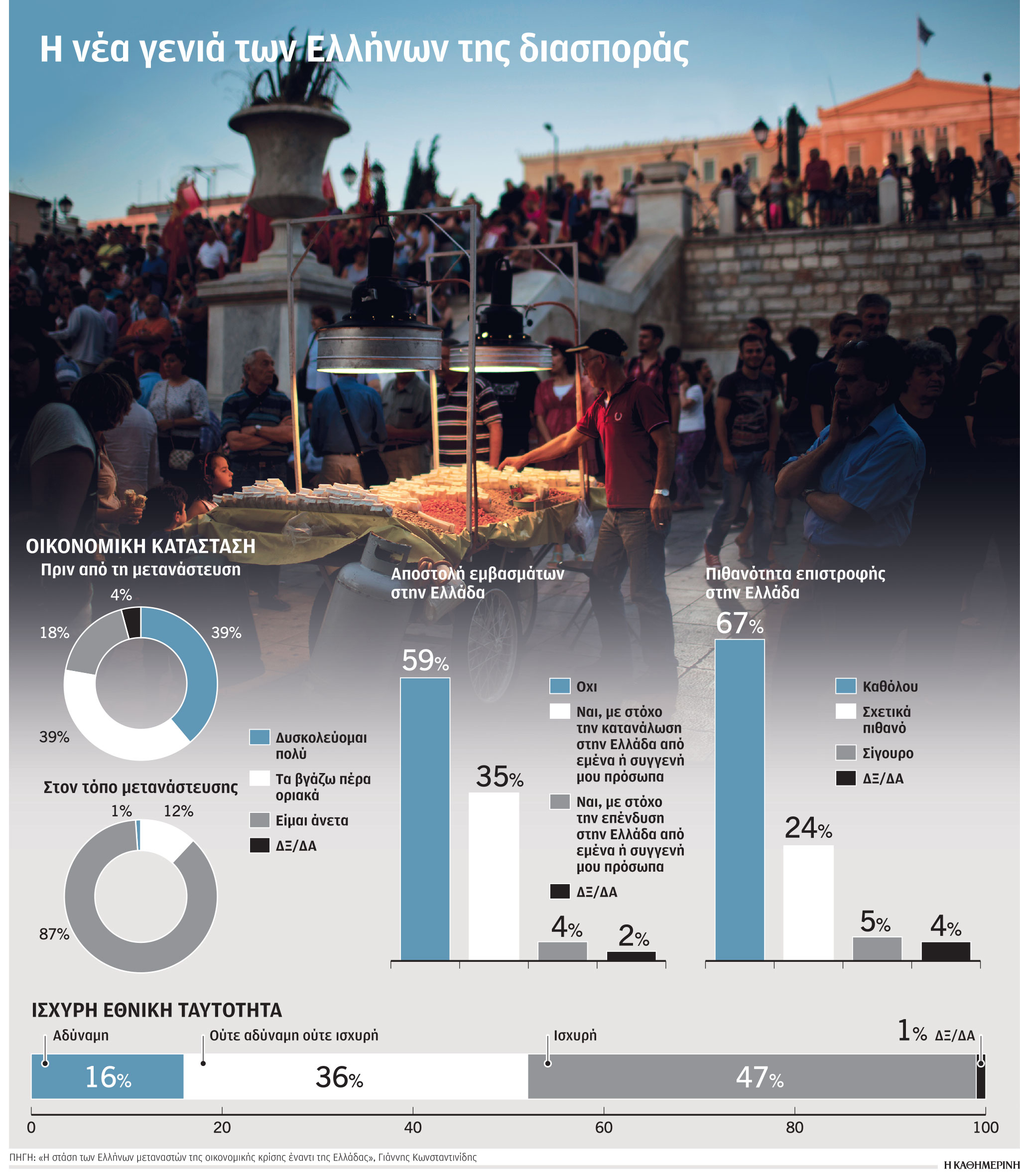
Their connection with Greece was severed. The country has let them down. Here they grew up and studied, but were forced to leave because of the financial crisis. Did they throw the black stone behind them? It is hard to believe, because we know the importance of the Motherland, family ties, the need for identity.
However study presented today by K with the title “The Attitude of Greek Immigrants in the Conditions of the Economic Crisis to Greece” turns everything we know so far about the Greek diaspora, which has nosto, sends remittances, makes investments. “Greeks who left in the 2010s do not want to return to the country, they seem disappointed, combined with their current good standard of living.
In fact, two out of three believe that Greeks who immigrated after 2009 are significantly different in mentality from their peers who stayed in Greece.” remarks on “K” scientific leader of the project Rebecca Child, Associate Professor, Department of International and European Studies, University of Macedonia. The study was aimed at collecting, synthesizing and obtaining knowledge about the attitude of the so-called “brain drain”. It was attended by over 500 Greeks under the age of 50 living in the UK, USA, Germany, Sweden, the Netherlands and the United Arab Emirates.
Circle of friends
In particular, the main reason for emigration is known to all: eight out of ten (78%) lived in Greece with great difficulty or barely survived. On the contrary, today 9 out of ten (87%) say that they feel comfortable financially, that is, they have a significant increase in living standards.
However, they have not yet integrated into society in a new place. The social circle of every second (46%) consists of Greeks or immigrants from another country (28%). Only one in four (24%) has a friendly and social circle of local residents. That is, the social circle of Greek immigrants abroad is more limited than their peers in Greece.

The research reverses what we know so far about the Greek diaspora, which has nosto, sends remittances, invests.
Their identity is defined by the people in their environment, not by the general characteristics of the community. They mostly have a strong national identity (47%, according to the statements of those participating in the survey), but not religious (56% characterize it as weak), nor party (60% answered so).
Of course, the migration of the 2010s is nothing like the migration of the first post-war decades. At that time, Greece was a very weak country economically. However, it plunged into a (multi-level) crisis in 2010 after a long period of prosperity. Thus, the majority of immigrants (59%) do not transfer money to Greece, although the vast majority of them say that the money earned in the place of immigration is excessive for them. In total, 39% send money to relatives or save money for the purpose of some kind of investment in our country.
We should not be pleased by the fact that just over half of the respondents (54%) answered that they would participate in the plan of supporting the country abroad. It is noteworthy that three out of ten respondents (29%) said they would not want to do this, and 13% refused, citing the fact that they could not.
Two in three (67%) said they were unlikely to return in the next five years, one in four (24%) said it was relatively likely, and only 5% said they planned to return within that time frame. The factors capable of returning to their homeland are the focus of the market and the state on research and innovation (38%), the consolidation of meritocracy in the selection of personnel (28%) and documenting the coherence of the state in relation to the citizen (14%)). As the study concludes, “Greek immigrants do not feel that in practice there is any motivation that could be put on the scale of their choice to return to Greece, while at the same time the country identifies itself with a structure and culture that is sufficient. disgusting for them.”
Right to vote
In view of the upcoming national elections regarding their voting rights, 76% of the participants said that Greeks who immigrated abroad after 2009 should have the right to vote in Greece. On the contrary, 13% disagree. In addition, 45% of those who immigrated between 2009 and 2010 believe that foreigners should share the right to vote with them. 37% disagreed with this position. The remaining percentage up to 100% refers to those who neither agree nor disagree with the question. According to data, in the early years of the financial crisis (revealing, a study by the Bank of Greece), about 500,000 Greeks immigrated abroad. “The goal of the research group is to collect, summarize and produce knowledge that will contribute to the formulation of modern political proposals for the country’s relations with the Greeks of the world. The first step towards achieving this goal is to get to know this new diaspora emerging from the financial crisis and understand its relationship to Greece. We saw that there is a gap there,” said Rebecca Paidi, Project Supervisor, Associate Professor at the Department of International and European Studies at the University of Macedonia. The study, funded by the Hellenic Research and Innovation Foundation (ELIDEK), is based on trends documented by the project’s research team in the international literature on the diaspora and its relationship with the country of origin. The research team included, in addition to Ms. Paidi, Mr. Giannis KonstantinidisAssociate Professor, Department of International and European Studies, Macedonian University. Anastasia Blokhutzisresearch fellow of the same faculty.
“In Athens they gave me what I was paid as an unskilled worker in Germany.”
Apostolos Lakas, Ioannas Fotiadis
 The 44-year-old teaches globalization and international political economy at the University of Brighton. Vassilis Leontytsis. Despite studying in the UK, he returned to Greece in hopes of rebuilding his life at home. In 2017, he could not stand it and threw … a black stone. “Here I encountered a different mentality than in Britain. Much of what we take for granted abroad – say, the issues of medical care and insurance coverage – is not in Greece, where there is a lack of organization and professionalism. The political system should protect and improve institutions such as the judiciary, the bureaucracy should disappear, it should practically reinforce the political message in favor of meritocracy,” notes Mr. Leontytsis.
The 44-year-old teaches globalization and international political economy at the University of Brighton. Vassilis Leontytsis. Despite studying in the UK, he returned to Greece in hopes of rebuilding his life at home. In 2017, he could not stand it and threw … a black stone. “Here I encountered a different mentality than in Britain. Much of what we take for granted abroad – say, the issues of medical care and insurance coverage – is not in Greece, where there is a lack of organization and professionalism. The political system should protect and improve institutions such as the judiciary, the bureaucracy should disappear, it should practically reinforce the political message in favor of meritocracy,” notes Mr. Leontytsis.
The 34-year-old architectural engineer works as a technical consultant in Stockholm. Eftichia Stamatakis. “After graduating from university, I worked in my uncle’s design office,” he recalls. “In 2014-2016, the construction industry experienced a sharp decline, and Eftikhia realized that he could not make a living. “My parents were supposed to support me, so I figured that as long as they can support me, I’d better buy new supplies.” In August 2016, he is pursuing a Master’s degree in English in Energy Planning from Lund University in Sweden. Three months after graduation, he found a job. “In Sweden, you feel like the state respects you when you ask for something to be processed by the public, it may take some time, but it will be done.” She declares herself a “winter child”. “That’s why, in the end, I chose this country, I know Greeks who suffer here over time.” Eftikhia has no plans to return to Greece. “I jokingly say that with a Swedish pension, which is small here, I will spend my old age in Greece.” However, he has one caveat. “The situation in Sweden is starting to change with the new government,” he explains, “so I don’t want to be absolute, because as a student I declared that I would never leave Greece.”
“Anyone who wants to find a job in Germany will find one,” a friend told him. It was the first idea that prompted him Panos Sidiropoulos nine years ago the whole family immigrated to Germany. “I was done with my finances, doing various internships, mostly unpaid,” recalls a 35-year-old man who works as a data analyst for a large company in Cologne. “In Thessaloniki, the job market was almost dead, you could only find a good job if you had someone you knew.” “My friend and I started studying German, left after a while,” he describes, “both received a master’s degree and gradually fully professionally rehabilitated.” There are several moments when Panos and his wife miss Greece. “Anyway, two of my best friends from the university are already in Germany, and the third one is in Cyprus,” he notes. In 2018, with an impressive resume, he received a job offer in Athens. “The money they gave me was what I would get as a laborer working 4 hours in Germany…”.
Source: Kathimerini
Ashley Bailey is a talented author and journalist known for her writing on trending topics. Currently working at 247 news reel, she brings readers fresh perspectives on current issues. With her well-researched and thought-provoking articles, she captures the zeitgeist and stays ahead of the latest trends. Ashley’s writing is a must-read for anyone interested in staying up-to-date with the latest developments.